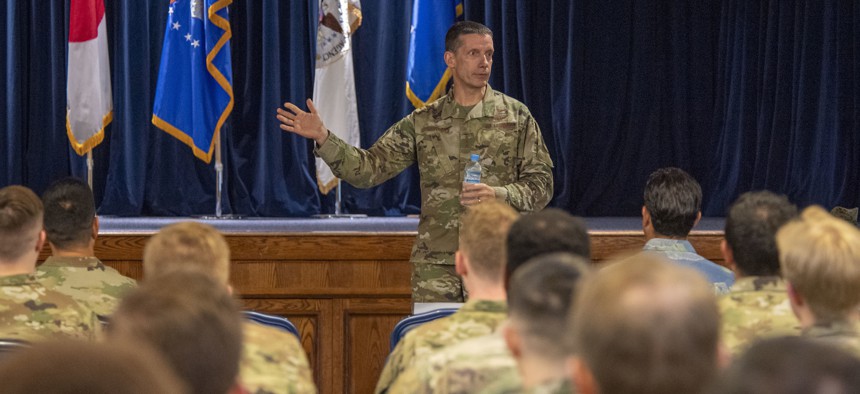DISA pilots 'concierge AI' to help staffers
The agency is undertaking some early proof of concept initiatives, including a “concierge AI” tool, to see how emerging technologies can support its workforce.
The Defense Information Systems Agency is embracing some early uses of artificial intelligence and sees the potential for the emerging technology to enhance its workforce’s capabilities, agency officials said during an event hosted by the Armed Forces Communications and Electronics Association’s D.C. chapter on Thursday.
Steve Wallace — DISA’s chief technology officer and the director of the agency’s emerging technology directorate — said its fiscal year 2024 technology watchlist included a “concierge AI” to take data from controlled unclassified information — or CUI — documents and other sources, drop them into a database and then “have a large language model bang against that database and present the user with answers.”
During DISA’s forecast to industry event in November 2023, Wallace similarly said that large language models and AI tools could serve as an effective “digital concierge” to help personnel “in all aspects of their job.”
“I think the concierge AI can be used in a multitude of different ways,” Wallace said on Thursday, noting that the tool can be used to maintain after-action reports or work on “the assistant-side of things” to, for example, provide personnel with the ability to quickly query a system to request a new laptop.
Although Wallace said he anticipated DISA “launching an internal-prototype within the agency for that concierge AI” within the first half of 2024, he added that “to be blunt, I wish it were going faster.”
“Many of the models live in commercial clouds, and so that ability to take CUI queries and bounce them off of that and get an answer is kind of frowned upon,” he said. “So it's, how do we do it either [on-premises] or look for the providers to start to move some of those models into some of the govcloud IL5 or IL6 environments?”
Incorporating AI technologies across DISA, however, remains a priority, and officials see greater adoption of these tools as a key component of the agency’s work moving forward.
During a keynote speech at Thursday’s event, DISA Director Lt. Gen. Robert Skinner said one of his main concerns is “leveraging AI and the products and capabilities that we have to make our force more agile and more effective.”
Wallace echoed the director’s sentiment, saying that the agency is “very interested in seeing how [AI] rides side-saddle with our folks, regardless of their function.”
And despite some concerns across government about how AI and other emerging technologies might be leveraged by nefarious actors to undermine national security interests, Skinner said continued U.S. tech superiority and adoption of these tools can help to alleviate some of those worries.
When asked specifically about DOD’s broader ethical principles surrounding uses of AI technologies versus adversarial nations’ lack of mandated guardrails, Skinner voiced some concern but said “we just have to make sure that we continue to be at a position of advantage.”
DOD previously released a set of ethical AI principles in 2020 governing its use of emerging technologies and subsequently released a responsible AI toolkit in November 2023 to help guide the incorporation of the next-generation tools across its mission.
NEXT STORY: IRS gears up to launch Direct File pilot






